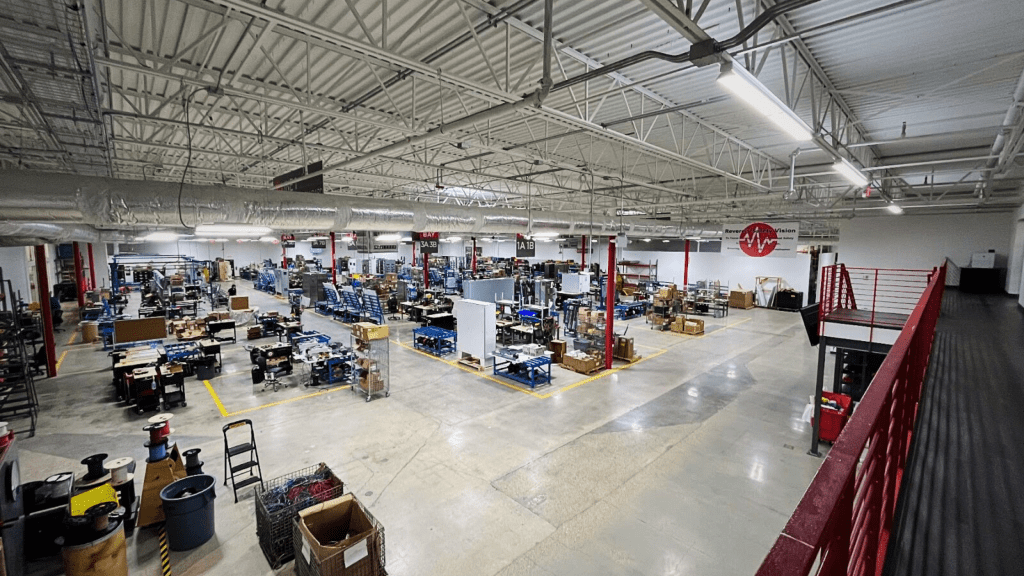At Revere, our panel shop is central to project delivery. Each year, the team builds between 3,000 and 4,000 control panels, supporting industries from municipal water to renewable energy. These include MCCs, PLC panels, relay panels, VFD enclosures, E-houses, and other custom applications. But it’s not just the volume that sets the shop apart — it’s the Revere Standard: a systematic approach to craftsmanship, documentation, and quality control refined over decades.
This article offers a high-level look at how Revere’s panel shop operates — and how its tools, processes, and culture contribute to consistent, reliable panel builds from design through shipment.
The Revere Standard
Revere’s panel shop operates with a defined set of practices known internally as the Revere Standard, a detailed set of guidelines that standardize how panels are built. The Revere Standard is the backbone of the panel shop; every technician in the shop is trained using this handbook. Even the most granular details — like which side of a screw a wire should land under — are standardized for consistency and function. The result? Panels that are immediately recognizable in the field, no matter the technician behind the build.
The panels Revere built 15 years ago look the same as the ones being built today. This isn’t just about visual appearance, but also quality, ease of inspection, and maintenance over time.
The Panel Completion Checklist (PCC): a Phase-gate Approach
At the core of Revere’s production process is the Panel Completion Checklist (PCC) — a custom-built digital tool that guides each panel through a series of clearly defined steps. Used by engineering, shop technicians, QA, and shipping, the PCC ensures that every panel is built, reviewed, and tested according to Revere’s internal standards.
Each panel moves through a set of tabs in sequence, and no stage can be completed until the one before it is signed off.
PCC Workflow Stages:
- Project Overview: Captures specs, drawings, certifications, and deadlines. This is filled out before production begins — ensuring clarity and accountability from the start.
- Wiring: The shop technician documents every task completed, from verifying connections to AC/DC separation.
- Quality: A dedicated quality assurance team member — never the same person who wired the panel — reviews the build.
- Testing: Engineering validates both the quality and function of the panel against customer requirements.
- Punch List: Any identified issues must be resolved and signed off before shipment.
Shipping: Only after all steps are complete is the panel released for packaging and delivery.
Importantly, each tab is locked until the previous one is signed — and critically, no individual can sign off on more than one stage. This structure enforces a clear separation of responsibility and multiple checkpoints, ensuring that panels don’t move forward unless they’ve been reviewed by fresh eyes, at each step, with clear accountability.
No Untested Panels — Period
Hanging on the wall inside Revere’s shop is a simple, powerful message: “No panel leaves Revere untested.”
That’s not a slogan — it’s a cultural and operational commitment. Panels can’t ship without passing final functional testing. If there’s ever a situation where a panel needs to ship before testing, it requires approval from a company vice president. That happens rarely, and only when there’s a clear reason and the customer understands the risks.This policy stems from hard-earned lessons: early issues with untested panels led to a zero-tolerance stance that now acts as a quality gate before shipping.
All Under One Roof: Facility and Flow
Revere’s panel operations used to span five separate buildings. Today, they’re all consolidated into a single facility — formerly a grocery store. The main production floor occupies what was once the store’s center, while engineering, IT, and executive teams operate from the converted storefront wings.
The layout is intentional, designed for optimal workflow:
- Four primary aisles of work bays
- Dedicated testing zones
- Integrated shipping and receiving
- Room for additional growth
This consolidation has delivered huge efficiency gains, making communication faster and project execution more responsive.
Real-Time Visibility and Tracking
Panels are digitally tracked across the floor — from parts status to stage completion — using a color-coded bay and kiosk system. At any time, each technician can view:
- Which parts are in or pending
- What stage the panel is in
- Who last signed off on each step
- Where the panel physically sits on the shop floor
Tools, Certifications, and Standards
Revere’s CNC (Computer Numerical Control) machine is used for precision drilling and tapping of backplates and enclosures. It supports panels up to 90 inches tall and helps reduce manual labor while increasing consistency.
Other in-house tools include:
- Laser engraving for custom labeling and nameplates
- Automated nameplate creation
Revere builds panels to UL 508A standards by default, and applies the UL label where required. Additional certifications like CSA (for non-hazardous applications) are offered when needed.
Certification is especially important in public sector projects like water and wastewater — and Revere has passed every CSIA audit with high scores. Most recently, the shop completed a two-day audit by a power generation OEM, with four inspectors on site. The audit feedback noted: “PCC was impressive and one of the best systems we’ve seen for progress tracking.”
A Culture of Consistency
From the Revere Standard to the PCC and bay tracking system, everything is built to reduce variability, increase visibility, and protect against error. Panels are reviewed by multiple people, at multiple stages, and supported by real-time systems that ensure nothing slips through the cracks.
The panel shop is a process-driven environment focused on doing things right the first time. Whether a client provides a finished design or needs something custom, Revere’s goal remains the same: build panels that are dependable, thoroughly tested, and ready for the field.
As one customer put it: “Revere is like a fire-and-forget weapon. We never have to worry about them hitting the target.”

